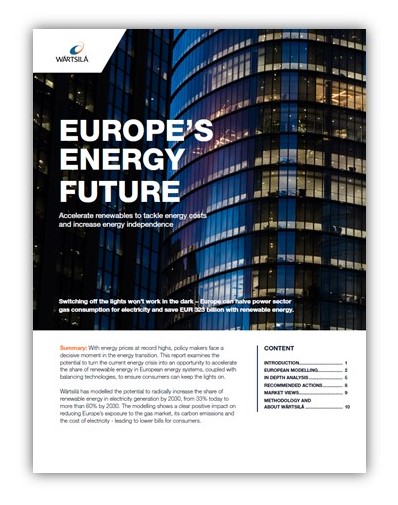

Let's keep the lights on
If the sky-high energy prices keep on rising, we will have to get used to saving on the bills wherever we can. Switching off the lights won’t be a once-a-year statement. It will be the norm, every day.
It’s a dim future – but one we can avoid.
With energy prices at record highs, policy makers face a decisive moment in the energy transition. We now have the opportunity to transition quickly and definitively to renewables, coupled with balancing technologies, enabling cutting emissions and harnessing the potential of unlimited clean power. The best part? Saving the planet also means saving your money.
At Wärtsilä, we have modelled the potential to radically increase the share of renewable energy in electricity generation by 2030, from 33% today to more than 60% by 2030. The modelling shows a clear positive impact on reducing Europe’s exposure to the gas market, its carbon emissions and the cost of electricity – leading to lower bills for consumers.
We have all of the technologies and expertise we need for a rapid transition. All we need now is the political will. The time is now.
Two scenarios for Europe's energy future
We have modelled the potential to accelerate the roll-out of renewable energy across Europe by comparing two scenarios – Baseline and Ambitious. The results show how renewable targets will affect the power sector’s gas use, carbon emissions and cost.
Increasing energy independence does not need to cost more for power companies or energy consumers. Accelerating the transition to a clean energy system could save European countries 323 billion EUR by 2030, compared to our modelled baseline scenario.
In addition to cost savings, the Ambitious scenario offers increased energy independence. In this scenario, the annual gas consumption can be cut in half by 2030. This would significantly reduce carbon emissions and reliance on imported gas supplies.

Europe can halve power generation emissions and gas consumption by installing 80GW of renewable energy per year before 2030.
By 2030, Europe can halve its power sector’s emissions and gas consumption. All of this would have seemed unthinkable a decade ago. Yet the combination of plummeting technology costs, the imperative to shift away from fossil fuels and the climate challenge have made it politically acceptable and economically sensible.


